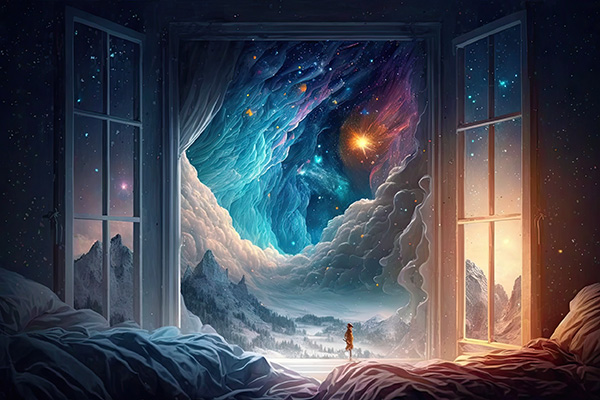spirit dreams
The Subconscious Secrets Of Dream Symbols
 Clients sometimes ask me to help them interpret a dream that’s intrigued them, or which has been of great concern to them.
Clients sometimes ask me to help them interpret a dream that’s intrigued them, or which has been of great concern to them.
I feel that the best people to interpret dreams are the dreamers themselves, but I will always give my take or feeling on the deeper meaning of the dream, and suggest they take my version on board only if it truly resonates for them.
Our dreams have been a source of fascination since the beginning of time. Many cultures see dreams as life lessons, as a means for our ancestors or loved ones in spirit to connect with, and to communicate with us. Amongst those cultures, much emphasis is placed on dreams as a means of prophecy.
Often these dreams are meant to guide us or to warn us of impending danger, but sometimes they are meant to just to show us that we are indeed loved by those in the spirit world.
Often too, I have found, we can wake up with a sense of peace in our hearts, knowing we’ve communicated things to another soul. This could be something which was perhaps left unsaid at the time of their transition to the other side.
The veil between this world and the next is a thin one, and using our dreams can help us to build a bridge between the worlds.
Although some people tell me they never dream, we all have the ability to dream when we slip into an altered state of consciousness during our sleep cycle. Our dreams are a natural part of life’s rich tapestry, revealing parts of ourselves which we otherwise might fail to see. In opening up to the dream state we can work on healing our deeper fears and issues.
A Message To Those Who’ve Lost Their Light
 The other night, before going to bed, I quietly spoke to my deceased grandfather. I asked him to help me find the right words. Something to bring hope and comfort to so many of my clients who’ve been feeling lost, weighed down, or tired of carrying their pain.
The other night, before going to bed, I quietly spoke to my deceased grandfather. I asked him to help me find the right words. Something to bring hope and comfort to so many of my clients who’ve been feeling lost, weighed down, or tired of carrying their pain.
I asked him, “Please, Grandpa, show me what to say. Help me give them what their hearts need most.”
That night, I dreamed. But it wasn’t just a dream. It was a visitation. The air around me grew still and was filled with a golden glow that felt like peace and love. From that light, my grandfather appeared.
He didn’t look the way I remembered him from his later years, but he looked strong, bright, and full of calm energy. His eyes held the same gentle understanding he always had, but it was deeper, almost eternal.
He smiled and said softly, “I heard you. I’m here.”
Then he said, “If there’s a dream or passion that still burns inside you, don’t let it fade. That spark within you was placed there by something greater than yourself. Even when the world feels dark, your light hasn’t gone out. It’s only waiting for you to rise again.”
He looked at me, and I could feel the weight of his words, as if they were wrapped in love.
“Don’t let anyone steal your sparkle,” he said. “There will always be voices that doubt you or make you question your worth, but their disbelief can’t touch what’s divine within you. The light in your spirit is stronger than their shadows.”
Crossing Over Into Unconditional Love
 Is my mom okay? Is my dad still in pain? Is my friend trying to speak to me? Is my grandmother proud or ashamed of me? Does my husband forgive me?
Is my mom okay? Is my dad still in pain? Is my friend trying to speak to me? Is my grandmother proud or ashamed of me? Does my husband forgive me?
These are just a few of the many questions that I am asked by bereaved family members and friend, when they lose someone dear to them.
Firstly, it is important to understand that we are all spirit with a temporary physical body. And we have free will in how we choose to live our lives. Some of us choose to be kind and giving, while some are abusive and filled with anger. It is not our place to judge each other, simply to know that free will was a gift given to us before we came into this current physical body.
When I am asked these questions, the initial part of the answer is always going to be the same. The person that you lost simply left their physical body behind; their spirit never faltered.
When someone crosses over, no matter who, or how, the moment of crossing is always met with pure love. Their angel reaches out a hand and when they touch the light shows them that there is nothing to be afraid of.
They instantly know that the place where they are returning to is a place of light and harmony. It is a place of pure, unconditional love. Hate disappears, hurt or pain disappears. There is no shame, not disrespect. And there is only unconditional love for those that remain here on earth waiting for our turn to join them.
Are Your Loved Ones Sending You Signs?
 Have you ever felt as if someone who has passed away was trying to reach out to you? Have you noticed any unusual signs? Maybe you suddenly caught a whiff of their favorite perfume? Or maybe a song you associate with them started playing when you were thinking of them.
Have you ever felt as if someone who has passed away was trying to reach out to you? Have you noticed any unusual signs? Maybe you suddenly caught a whiff of their favorite perfume? Or maybe a song you associate with them started playing when you were thinking of them.
Though these moments may seem insignificant or random, they could actually be signs from beyond. Yes, really. The people we love who have passed away are still with us. They’re energetically around us more than we realize, watching over us and cheering us on.
Sometimes they try to send us reassuring messages, but we don’t always pay attention. Life can get hectic. It’s easy to miss these signs when we’re busy with our daily routines.
But the signs are still there. We just need to slow down, take a breath, and open our hearts to noticing them.
Not everyone sends the same kind of sign, and not every spirit communicates in the same way. Some loved ones are very obvious. They might move items like coins or feathers for you to find, flicker lights, or send a butterfly or dragonfly right into your path.
Other signs might be more subtle. They might cue up a meaningful song for the two of you or make the number 11:11 appear repeatedly until you finally say, “Wait a minute…what’s up with that?”
These are all ways they’re saying, “Hey! I’m here. I’m okay. I see you. Are you okay? No need to worry; you’ll be just fine. I’m looking out for you.”
When Spirit Says Thank You From The Other Side
 If you enjoy ghost stories that prove the existence of an afterlife and demonstrate spirit communication from beyond, you may be interested in the following account of a genuine supernatural event among my family and friends.
If you enjoy ghost stories that prove the existence of an afterlife and demonstrate spirit communication from beyond, you may be interested in the following account of a genuine supernatural event among my family and friends.
When he was younger, one of my cousins used to hang out with a group of friends who often got into harmless mischief. They were inseparable.
One of his closest friends eventually got married and lost his job soon after. Unfortunately, he quickly got into debt, his wife left him, and he had a very challenging relationship with his mother. His debts spiraled, he could not find a new job, and his wife showed no signs of wanting to reconcile.
The poor guy felt doomed, believing that life would never improve for him, no matter how hard he tried. Nothing changed, and things only got worse. Seeing no way out, he drove into the woods near his home one cold November night and ended his life.
I only wish I had had the opportunity to speak with him before he took this drastic step. I would have told him that life is too precious to contemplate such a thing. In fact, I emphasize to anyone considering suicide that they need to seek professional help immediately.
Nevertheless, it was too late to save my cousin’s dear friend.
He left a note for his friends, stating that he didn’t want his wife nor his mother at his funeral. He also asked that they sell the van in which he passed away to pay for the funeral, as he had no other means of funding it. Continue reading →
Nurturing Soul Bonds Beyond Rational Understanding
 Psychology has provided us with invaluable tools for navigating life’s challenges. It helps us understand ourselves and each other, improves our communication, and builds stronger relationships. Whether we’re managing stress, boosting emotional intelligence, or making better decisions at work or at home, psychological insights guide us toward healthier, more connected lives.
Psychology has provided us with invaluable tools for navigating life’s challenges. It helps us understand ourselves and each other, improves our communication, and builds stronger relationships. Whether we’re managing stress, boosting emotional intelligence, or making better decisions at work or at home, psychological insights guide us toward healthier, more connected lives.
However, there’s another layer to our existence that studying the mind alone can’t fully reach. While psychology breaks things down into patterns and causes, the soul deals in ongoing, heart-to-heart connections that go beyond intellectual discussion and analysis.
Psychology can explain why we feel anxious, how old wounds still affect us, and which coping strategies we tend to use. This kind of insight can spark real change.
However, understanding alone stops at the intellectual level. It doesn’t inspire the deeper truths and wisdom that make us feel truly alive and connected.
This is where ‘soul care,’ rather than analysis or therapy, offers a different path.
Rather than observing ourselves and others as case studies, soul care invites us to honor all our relationships — past, present, and future, as well as beyond this life — with warmth and continuity. It invites us to see friends, family, teachers, and deceased loved ones as conscious, eternal presences to be celebrated, not merely dissected.
Decoding The Mysteries Of Your Dreams
 One thing we all have in common is our dreams. Even if we don’t remember them, we all dream every night.
One thing we all have in common is our dreams. Even if we don’t remember them, we all dream every night.
Our dreams take us to strange, surreal landscapes and scenarios — unusual places and odd situations that don’t follow the rules of the waking world. That’s because dreams don’t speak in logic or reason. They communicate through symbols, metaphors, and abstractions.
For centuries, people have sought to decipher the mysteries of dreams, from the dream interpretations recorded on ancient Egyptian papyrus scrolls to the psychoanalytical theories of Carl Jung. Jung believed that dreams speak through archetypes — universal symbols woven into the fabric of our collective unconscious.
Just as no two people are exactly alike, no two dreams are alike. Certain symbols — such as water for emotion or flying for freedom-appear across cultures, but their meaning is personal, shaped by our experiences, beliefs, and emotions.
Some dreams uplift us, while others leave us puzzled or even shaken. But what do they really mean?
Psychologists see dreams as a bridge between the conscious and subconscious mind, a way to process emotions, work through inner conflicts, and make sense of life. But beyond their psychological role, dreams also have a deeper, more mystical significance — one that is often overlooked.
- Mafredo on Psychic Forecasting Of The Financial Markets
- Joan on Reflections On Time…And The Timeless
- Ma8 on Reflections On Time…And The Timeless
- Flowers name in Hindi on The Mystical Secrets Of Flowers
- Pam on How To Connect With Your Guardian Angel
- astrosaiganesh on How To Navigate The Sun’s Debilitation In Libra
- mahendar on What Happens To Our Pets When They Cross Over
- Megan Gutleben on How To Maintain A High Vibe Every Day
- spiritual healing on The True Role Of The Spiritual Healer
- Mballe on Why Some Souls Depart This Life Early
- Elizabeth Ocskay on The Mystery Of Soul Groups And Soul Contracts
- Christopher Guleff on The Mystical Purpose Of Daydreaming
- devanand astrologer on Psychic Messages In Mediumship Readings
- Linda Deir on Our Pets Speak To Us In This Life And Beyond
- Veronica on Why Some Souls Depart This Life Early
- astrologer devanand on Chakra Balancing Is An Essential Self-Care Practice
- Kirti on How To Deal With Negativity And Toxic Drama
- psychicramdev on How To Navigate The Sun’s Debilitation In Libra
- Grace on The Psychic Technique Of Remote Viewing
- Pam on Energy Protection 101